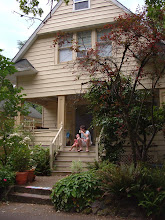 This is what our coffee table looks like by Wednesday. (Actually, this is what it would look like any day of the week if one of you dropped by unannounced. If you want a cleaner house, we need at least a few hours notice.)
This is what our coffee table looks like by Wednesday. (Actually, this is what it would look like any day of the week if one of you dropped by unannounced. If you want a cleaner house, we need at least a few hours notice.)The entire living room looks much worse: There are a couple of days-old half-full glasses of water on each side table (at least they're on coasters). And the mantel is a temporary resting place for an unopened box of light bulbs, a sorrowful Christmas cactus, an IKEA lamp that still hasn't found a permanent place to live in our house, the receiving end of a baby monitor, a ball of multi-colored sock yarn saved from the jaws of our cat, a bright yellow 100-foot measuring tape that weighs about five pounds, and a lovely set of Chinese bud vases some dear friends gave us as a house-warming gift (this last item really does want to live on the mantel, but can't really feel at home what with the overcrowded conditions).
Think of our coffee table as a symbol of the rest of our house: messy but inspiring.
For instance, from that pile emerged a great essay from the June 30 issue of the New Yorker: "Altered State" by Andrea Lee. I'm still thinking a lot about the ideas of belonging and patriotism I wrote about in my July 5 posting (which some of you talked to me about offline--thanks for the feedback!). So perhaps I'm just ripe for Lee's thoughts about her home state of Pennsylvania--about which she writes, "I'm not sure I love it, but it's mine."--and her sense of always feeling like a foreigner. But what most struck me, aside from her amazing skill as a writer, was the deep thought she's put into her past, not simply narrating it, but contextualizing it and using it to explore how she ended up where she is today: an African American novelist who married an Italian and is now raising her family outside of Turin:
When describing another American family (oddly enough, also from Pennsylvania) that lives nearby, she writes, "[They form] a traveling homeland still magically connected to that landlocked region, where there are school friends, cousins, acres that bear their name."
When remembering how she was the only African American child at a summer camp, she describes trying to fit in: "I try hard, out of an animal sense of self-preservation, but also because I've always imagined winning the hearts of hateful people."
When pondering why one brother stayed in Philadelphia while she and her other brother live an ocean or continent away, she posits that the brother who stayed was her mother's favorite and writes, "And who can say whether being your mother's great love doesn't trigger a lifelong passion for your home, your city, your state?"
And near the end, when reminiscing about her home state with an Italian movie director, she realizes that perhaps he is "Someone who can stare, as he does, across land and sea toward a shimmering mirage of America."
Maybe it's because of the Fourth of July that I really took a shine to this piece. Or maybe it's because I've spent so much of my life feeling like an outsider. And it's hard to not to see some of James Baldwin (a hero of mine--and hers, I'm willing to bet) in Lee's work, which makes it especially compelling. But perhaps it's because there's an incredible amount of self-reflection going on right now--people exploring how they live and why, through books and lifestyle changes and blogs like this one--that it's inspiring to see it done right and well, artfully and eloquently, in an essay like this one.




1 comment:
My coffee table looks just like that- and I like the mantra "messy but inspiring" because that is at the heart of who I am- and who I've always been-hence the moniker "messy jessie" that I was called until I entered kindergarten!
Post a Comment